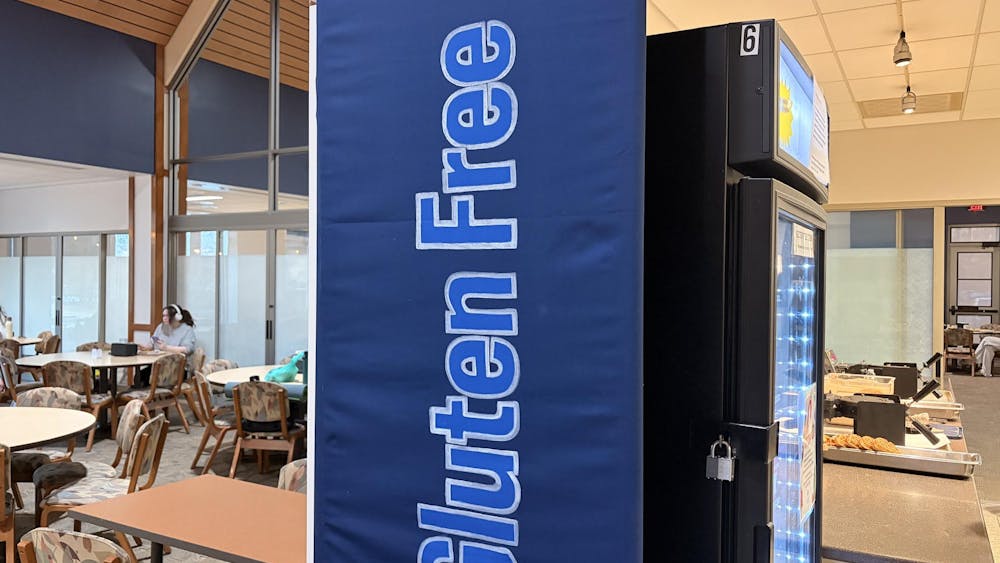Editor’s note: This is part one of a three-part series on mental health services at Notre Dame and Saint Mary’s. Follow these links to part two and part three.
National statistics reveal a high demand for mental health services at colleges and universities — demand that is only growing.
The Center for Collegiate Mental Health’s (CCMH)2018 annual report found student use of counseling services increased by an average of 30-40% between the fall of 2009 and spring of 2015. In 2014, the percentage of U.S. college students who sought these services was already at 11%, according toa study from the National Survey of College Counseling Centers (NSCCC) that year.
Even while college counseling centers nationwide struggle to fit students in for appointments, those who do seek counseling representonly a fraction of students with mental health-related problems.
Notre Dame is no exception. The University Counseling Center (UCC) has made a number of adjustments to accommodate high demand for mental health support, as well as expand its resources outside of traditional counseling and therapy. Still, timely care remains a challenge for the UCC, in part due to unexpected staff shortages.
“Like all universities, we are working to determine how we can best serve these growing mental health needs,” UCC director Christine Conway said in a statement to The Observer. “The UCC has instituted a number of changes this year to respond to the demand and better serve our students. We are also working on a number of initiatives, with other offices on campus, to support our students and promote mental health and wellness.”
A new counseling system
To meet students’ growing need for counseling services, the UCC switched to a new drop-in system last fall. With the drop-in model, students can have a counseling session the same day of their first visit.
“Drop-in appointments provide easy access to UCC services when a student needs them and more efficiently utilizes our resources,” Conway said in the statement. “The goal of the drop-in appointment is to understand the student’s concern, provide support, assess risk and develop a plan that connects the student to the services that will best address their concerns.”
Before, the UCC was overloaded by walk-in appointments. Students who were unable to wait for their scheduled sessions could visit the UCC during normal business hours to speak with a crisis counselor. More and more students would come in for crisis walk-in sessions rather than wait for their appointment, however, which overloaded the UCC’s treatment schedule, Conway said.
“Students who followed the rules would wait until their scheduled appointment and then they were actually receiving care later than those students that didn’t wait for the scheduled appointment,” she said.
This is why the new drop-in system was adopted.
Under the current system, in order to guarantee same-day appointments for students new to the UCC, counselors take new clients regardless of their current caseload, similar to a system known as the “absorption model.”
TheCCMH has raised concerns that the “absorption model” results in longer waiting times between sessions and less treatment for each client compared to models which retain incoming clients and assign new cases when they have space available.
“We try very hard to get students in for ongoing therapy and we also do our best to serve the students that we are seeing,” Conway said. “This is in part why the frequency of sessions gets spread out. Spreading out the frequency allows us to absorb new students gradually.”
Conway added “there is a little less time for ongoing treatment with the drop-in service,” but that this trade-off is worthwhile given the shortcomings of the center’s old model.
Still, she said, the UCC tries to balance providing care for long-term clients and making space for new ones.
“There are no session limits, but the UCC does operate within a short-term model, where students work on concrete goals and as those goals are met, they are encouraged to end treatment,” she said. “If issues come up in the future, students can again seek services to work on new treatment goals.”
Students are also referred to off-campus treatment if the UCC determines external resources would best suit their needs, Conway said.
Loss of full-time staff
The UCC did not provide data on how many students used its counseling services each year. However, given national trends reported by the The Association for University and College Counseling Center Directors (AUCCCD) in a 2018 study, this number is likely well into the hundreds.
This isn’t a small amount for Saint Liam Hall, especially considering recent changes in UCC staffing.
“The UCC has experienced a number of unexpected staff departures this year that we are actively working to fill,” Conway said. “These departures have left the UCC short-staffed this semester and this has impacted our ability to provide ongoing individual services to students as quickly and as frequently as we all would like.”
Conway said the UCC’s temporary solution is hiring part-time staff.
“We haven’t been able to totally replace the number of clinical hours that we lost,” she said. “Our goal is to have all of our positions filled by the start of the fall semester [2020].”
Many of the part-time staff are retired full-time staff or clinicians privately practicing in the South Bend Community, she added. Each is interviewed and is subject to background checks before they are hired.
“I have total confidence in their clinical skills and their professionalism,” Conway said.
The struggle with students’ high demand
A 2012 national survey from the National Alliance on Mental Illness found 16% of students regard long waiting times as a barrier to accessing or continuing mental health services.
According to the AUCCCD, for the size of a college between 10,000-15,000 students like Notre Dame, 40.4% of counseling centers mostly arrange appointments once a week, and 38.6% of centers arrange appointments around every two weeks.
For the UCC, the frequency of individual counseling sessions tends to vary over the course of the semester, Conway said. When demand is particularly high, individual sessions may be spaced out to one every two or three weeks.
A shortage of full-time staff can be an obstacle for students who have urgent needs, according to 2019 Notre Dame Law School alumna Ishpal Sidhu’s experience.
Sidhu has attention deficit hyperactivity disorder (ADHD), which made it hard for her to study. In December of 2016, she ran out of her prescribed ADHD medication, Adderall, days before her final exams. She went to see her mental healthcare professional, an adjunct staff member at the UCC.
Sidhu said the receptionist told her the staff member was working full-time off campus that day and would not be available to call until after 6 p.m., about two hours later. Sidhu tried to wait, but couldn’t bring herself to focus.
“I was trying to study there, and I just flipped out and I couldn’t,” she said.
In an email, Conway said the UCC part-time staff work 9 a.m. to 5 p.m., and the majority are present at the center two or three days a week.
“Students who see the PT (part-time) staff can come in during walk-in hours and see any other member of the staff if they need help on days when their PT therapist isn’t in the office or in between sessions with their regular PT therapist,” she said in the email. “The full-time staff would make a decision about how to involve the PT therapist if needed. Sometimes students have the email addresses of their PT therapists and use that as a way to be in touch, but that’s not the norm, they use the UCC standard ways of being seen in between scheduled [appointments].”
Community care
One way colleges and universities can help take pressure off of their counseling services is by providing additional mental health programs outside of clinical care. Known by some as the “stepped-care” model, this multi-layered system provides programming to support health and wellness for students with less intense mental health needs. In turn, this frees up counselors and other professionals to spend more time with students who require more involved care.
During the academic year, UCC has several “stepped-care” options for treatment, such as the TAO Self-Help Program, UCC Inner Resources Room for stress management, the “Let’s Talk” walk-in consultation service and several workshops targeting specific problems, such as stress and anxiety management, overcoming perfectionism pitfalls and self-compassion training.
Outside of the UCC, the McWell Center and Care and Wellness Consultants are also available for students.
Care and Wellness Consultants is the University’s first-step intervention program for struggling students — not only those who need mental health treatment — to help connect them with the resources they need. To do so, Care and Wellness Consultants collaborates with academic departments, the UCC, McWell and other University organizations.
Most often, students are referred to the center by faculty or or classmates. The system received about 700 referrals last year, director of Center for Student Support and Care Margaret Morgan said. She encourages those worried about their peers to consider reaching out, as the referrals are non-binding to students.
“Just because we make a referral doesn’t mean the student has to go there,” Morgan said.
At present, there are five consultants. Students can schedule an appointment with the consultant corresponding to their academic program on the Care and Wellness Consultants website.
Another center for student support, McWell, houses resources for student well-being.
“We are not a treatment office where students who are ill come to get well, but our resources tend to help most individuals maintain or improve their lives no matter what level of health they have,” McWell director Megan Brown said.
Around 500 students come to McWell each month, Brown said. The center provides classes such as Koru Mindfulness to reduce stress and increase focus, which 111 students registered for in the 2018-2019 academic year alone. McWell also launched Dreaming Domers to help students sleep better.
Sidhu said McWell was a major source of support for her at Notre Dame.
She suffered from insomnia, and sometimes wouldn’t get a proper night’s sleep forlong stretches of time. McWell’s sleeping kits, which she said include eye masks and essential oil spray, helped alleviate her insomnia.
Inside the center are also a number of “restorative spaces” where students can lounge or study. The spaces are decorated to be inviting and relaxing to students. The center also provides free coffee, tea and snacks.
Sidhu said McWell meant a lot to her when she found self-care difficult. The free snacks were her lifeline when she didn’t have the energy to go grocery shopping, and the aroma diffusing in the air helped her relax and feel comfortable.
“It's like when you walk into an environment where the energy is just good, you can’t really describe it,” she said of the space.
McWell also promoted a campus-wide campaign “Define Your Normal,” which focuses on supporting students so they feel like they belong at Notre Dame no matter their background or lifestyle.
“Through this campaign, we have collected thousands of qualitative stories about Notre Dame students’ emotional well-being, alcohol use and socializing,” Jenna Gehl Jones, assistant director for emotional well-being at McWell, said. “This data has been shared back with the Notre Dame community in multiple ways, and most recently, through the Moreau First Year Experience curriculum in both fall 2019 and spring 2020.”
Brown said McWell’s end goal is to weave wellbeing into the fabric of the Notre Dame student experience.
“Ideally, wherever students learn, live and laugh should be an environment that makes the healthy choice the easy choice,” Brown said. “As the director of McWell, my goal is to help students leave happier and healthier than when they arrived and take those skills of thriving into the world to make it a better place.”
Facing increased demand for mental health support, University makes changes to UCC, expands health and wellness programs
A ”restorative space“ at the McWell Center.
A ”restorative space“ at the McWell Center.









